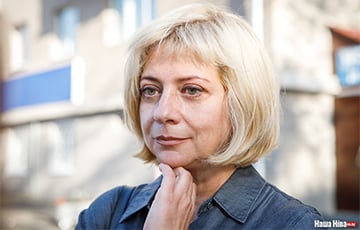Coffee Without Sugar
14- Iryna Khalip
- 2.02.2024, 18:12
- 26,720

PHOTO: NASHA NIVA
Solidarity continues to grow.
Every morning I start with an acute sense of guilt. The first cup of coffee on the balcony - and I am immediately twisted into a knot: Mikalai Statkevich can't drink coffee and enjoy the morning, he's in some unknown punishment cell in terrible conditions.
I leave the house, think about the route to the meeting - a short one, past ordinary houses, or a long one, but with picturesque views along the way - and the knot gets tighter. I think of Palina Sharenda-Panasiuk, who can't go for a walk, because even if she's not in the punishment cell at the moment, when many of us haven't even woken up yet in the early morning, she's walking with the group in the slushy mist to the "industrial workplace" to sew something for someone else under the supervision of all sorts of guards, brigadiers and so on.
I'm on the phone with a friend. We sigh about how long it's been since we've seen each other and discuss a future date; then another friend calls and we exchange news. The knot in my throat begins to tighten. I try to remember the last time Viktar Babaryka was able to call his relatives and at least tell them he was alive - and I can't. It was too long ago.
And of course, at night, when it's windy or raining outside and the room feels cosy and quiet, it's still impossible to fall asleep. Wrapped in a blanket, I feel guilty. I imagine Maryna Adamovich trying to sleep on the bare boards of Okrestina in the bitter cold. I can imagine hundreds of political prisoners in punishment cells and isolation wards, trying to keep warm and chattering their teeth with cold. I can imagine what they are thinking. And I feel ashamed for my own blanket, my walks, the opportunity to work in my favourite editorial office rather than in an "industrial workplace", my coffee and my mobile phone.
This guilt is so irrational that it can't be banished. It doesn't exist permanently, it only arises when there's a reason to enjoy life. The sea outside your window? Political prisoners have nothing but a prison yard or a "localka" in the colony. A glass of good wine? Political prisoners can't pour themselves a glass of wine, and there's no telling when they'll be able to. A quiet evening with a book when nobody is home? And political prisoners cannot even stay alone for a minute, let alone a sofa and a book available. And no common sense arguments ("you're doing your best for their release, you're spreading information, you're telling the world about them", "you had bunks and a prison yard too, and nothing, you survived and didn't give in, and they will survive and won't give in", "you don't make them better by forbidding yourself to enjoy life") don't work. And that's despite the fact that I don't look around and I don't flinch when there's a knock on the door. For those who are in Belarus today, even if they are not in prison, fear is added to the sense of guilt.
All of us, whether in prison or at large, in Belarus or not, are equally broken, wounded, skinless. Long before the country runs out of champagne, it will run out of antidepressants.
And yet we are alive. Amazingly, we are still capable of many things. We write letters to political prisoners and help their families. We come up with all sorts of activities to support them and raise the necessary amount of money for those in need in no time. We meet Western politicians and write articles. We hire former political prisoners and they start helping those still behind bars. Solidarity is still very important. It is the only thing that will save us all. And above all, it will save us again.
So let there still be coffee. And the sea and the garden and the blanket. We mustn't meet our heroes at large, broken and despondent. Ironically, it's also our duty to them to enjoy life.
"No sugar, please."
Iryna Khalip, especially for Charter97.org











